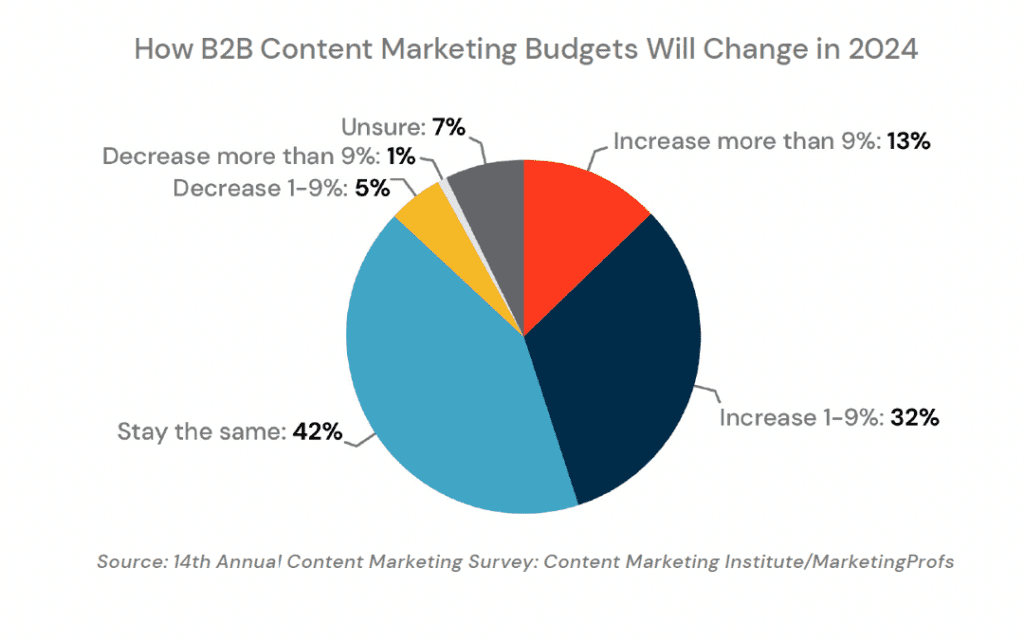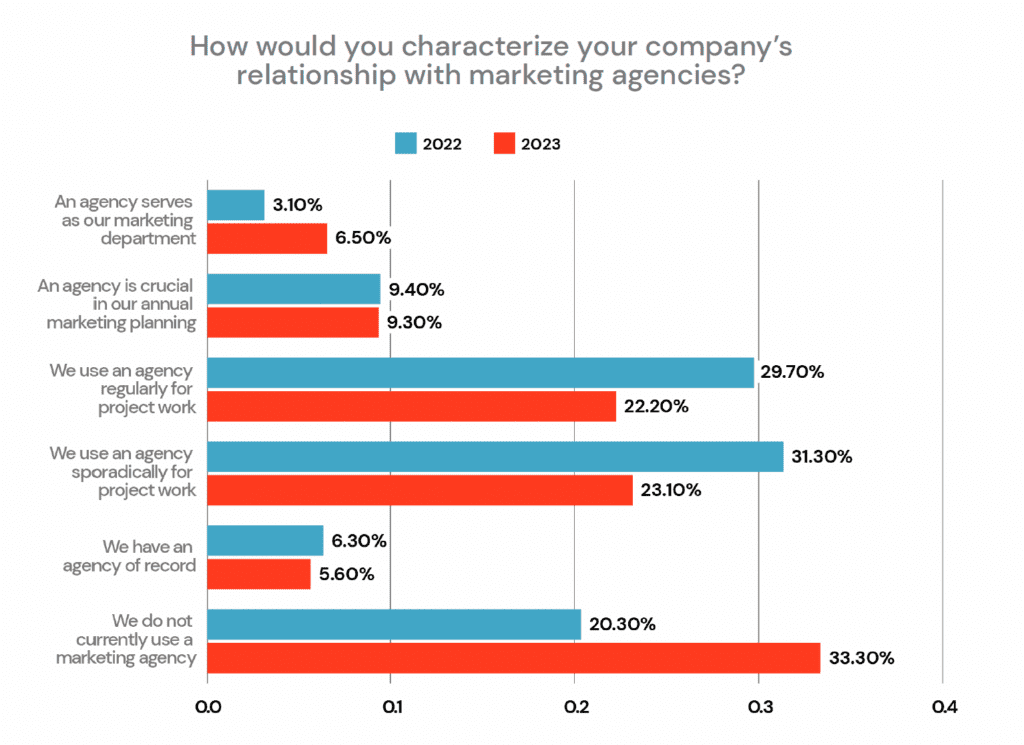Building the Right Marketing Team for Your Supply Chain/Logistics Business
Marketing is essential. There’s no question that companies need to have a distinct, well-rounded, strategic marketing strategy in order to stand out. That could be why more companies are expecting to see an increase in their marketing budgets in 2024.

According to Content Management Institute’s B2B Content Marketing Benchmarks, Budgets, and Trends: Outlook for 2024 report, 45% of companies expect their budgets to go up, while another 42% expect their budgets to remain the same.

However, your marketing success also depends on having enough marketing resources — including budgets, staffing, technology, etc. — to drive revenue growth.
This data from our 2024 Outlook and Trends: Supply Chain Marketing State of the Industry Survey underscores the importance of strategically allocating resources to marketing efforts based on a company’s revenue and size. As businesses grow, they tend to invest more in their marketing teams, whether by expanding their in-house staff or partnering with external agencies. These trends reflect the critical role that marketing plays in driving revenue growth and the need for companies to adapt their marketing strategies as they scale.
Our survey revealed several key findings about how companies allocate resources to their marketing teams based on revenue and company size:
- Companies with revenues under $500,000 typically have a marketing staff of just one person.
- More than 50% of mid-market companies (those with revenues between $1 million and $10 million) have marketing teams with more than three employees.
- Interestingly, the smallest firms often maintain a solo marketing staff member even after hitting the $1 million revenue mark.
- However, when a company’s total employee count surpasses 50, there is a noticeable shift, with marketing teams growing to 2-3 members. This could potentially indicate a reallocation of budgets and a heightened focus on growth.
- For companies with 100-250 total employees, scaling marketing teams becomes the norm, and most companies in this category expand their marketing departments.
These findings suggest that as companies grow in terms of both revenue and overall employee count, they tend to invest more heavily in their marketing teams. This underscores the importance of marketing in driving business growth and the need for companies to adapt their marketing strategies and resources as they scale.
And while the survey data shows clear patterns in how companies scale their in-house marketing teams, it’s important to note that building an internal team is not the only option for resource allocation. In fact, many supply chain, transportation, and logistics companies choose to work with marketing agencies to supplement their marketing efforts or to outsource them entirely.
Marketing Agency Investment
According to our survey results, more than 65% of supply chain marketers use an agency in some capacity. Most respondents (more than 45%) stated they lean on agencies for project work, while 21% use them as a critical part of their marketing efforts.

When it comes to choosing an agency, the majority of survey respondents (73.1%) noted they look for one that understands their business, followed by wanting an agency that understands their target customers. This seems to highlight the importance of understanding the nuances of the supply chain, transportation, and logistics industries, possibly because it lowers the learning curve and quickens their ability to get to work on deliverables.
In-House or Agency – That is the Question?
So, we know that companies are investing in marketing, and we know what they want from an outsourced agency, but how do companies decide when it’s right to build an in-house team versus allocating resources to an agency partner? Let’s explore that.
Benefits of an In-House Marketing Team
For many companies, especially larger businesses, often find value in establishing an in-house marketing team. This approach offers several advantages:
Creating Brand Experts
By building an in-house team, companies can cultivate the skills they deem necessary and that are tailored specifically to their industry, target audience, and business objectives. They can then invest in that team even further with employee training and professional development to ensure their marketing team has a deep understanding of the brand’s intricacies. This expertise facilitates more effective storytelling and strategic market positioning, giving the company a competitive edge.
Facilitating Communications and Teamwork
An in-house marketing team can quickly and easily communicate with one another, enabling efficiency, brainstorming or idea sharing, easy oversight, and comradery amongst team members. With team members working closely together, whether in the same office or virtually, coordinating efforts becomes more efficient. Immediate feedback and alignment with business goals are more easily achieved, because of the real-time collaboration and quicker decision-making processes.
Aligning with Company Goals
In-house teams are well-versed in the company’s culture and values, ensuring that marketing strategies align with broader business objectives. This alignment fosters a sense of ownership, commitment, and shared accountability among team members, driving unified efforts toward achieving the company’s marketing goals.
When to Hire a Marketing Agency
Investing in a marketing agency is not cheap, but it can be well worth it. For many companies, especially startups or those with fewer employees, partnering with a marketing agency can be a smart move. Agencies bring specialized expertise and skills that might not be available within a small in-house team that has to manage its time effectively.
Benefits of an outside marketing firm include:
Marketing Expertise Across a Range of Skills
Marketing agencies typically have extensive experience and tend to stay current with industry trends and best practices while also having access to specialized tools and resources. This knowledge and these tools enable them to deliver better results more efficiently.
Additionally, agencies provide access to a diverse set of skills, from copywriting and social media to graphic design and website development. Few businesses need these roles filled full-time, so partnering with an agency eliminates the hassle of hiring and managing a varied marketing team. Agencies already have the necessary talent in place.
Available Internal Resources
In today’s fraught economy, many employees are forced to juggle multiple roles to keep their operations running. Outsourcing marketing functions to an agency helps to reduce that workload so they can focus on what matters most to the business. Even companies with several employees might lack the time or skills required to execute an effective marketing strategy, and an ineffective marketing strategy is worthless.
Flexibility and Scalability
Agencies can also offer more flexibility in scaling marketing activities as the client business grows. They can adapt to changing business needs, shifting focus as required or adding more services as necessary. Similarly, if marketing needs to be reduced, an agency can more easily handle the downsizing compared to an in-house team.
A Third Option: The Hybrid Approach
Of course, there’s also the third option. The hybrid approach of maintaining an in-house marketing team while also partnering with an external agency can offer the best of both worlds. The in-house team brings a deep understanding of the company’s products, services, and target audience, while the agency provides specialized expertise, fresh perspectives, and additional resources to scale marketing efforts as needed.
For example, a company might have an in-house marketing manager who oversees strategy and coordinates with other departments, while relying on an agency for content creation, digital advertising, and web design. Another company might have a small internal team that handles day-to-day marketing tasks but partners with an agency for larger projects or campaigns that require additional support.
Ultimately, the key is to find the right balance between internal and external resources based on the company’s unique needs and goals. By leveraging the strengths of both an in-house team and an agency partner, companies can create a powerful, flexible marketing function that drives long-term growth and success.
Making the Right Choice
Partnering with an external agency can significantly enhance your marketing efforts. With access to specialized talent, scalability, flexibility, and fresh perspectives, your business can reach new heights. However, maintaining an in-house team is also a viable option.
There’s no right or wrong choice but there is a best option for each individual company. So, vetting your options, weighing your budget, determining your current team capacity, and outlining your marketing and overall company goals will help ensure you make the right decision for your company.
Interested in learning more about how supply chain, logistics, and transportation companies are allocating their budgets for their marketing investments, check out our 2024 Outlook and Trends: Supply Chain Marketing State of the Industry Survey Findings.
Interested in the Full Report?
Click the button below to access more information about the survey.


